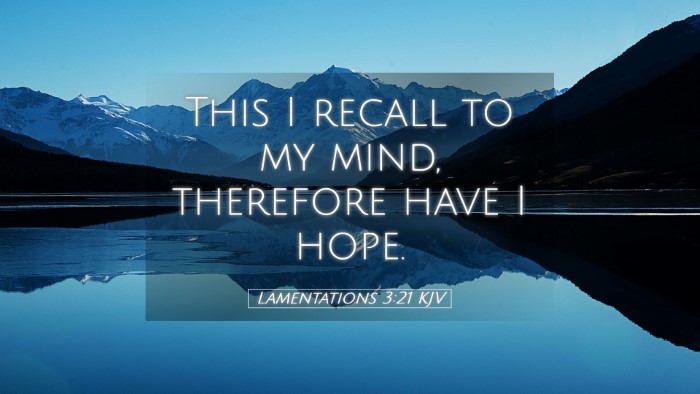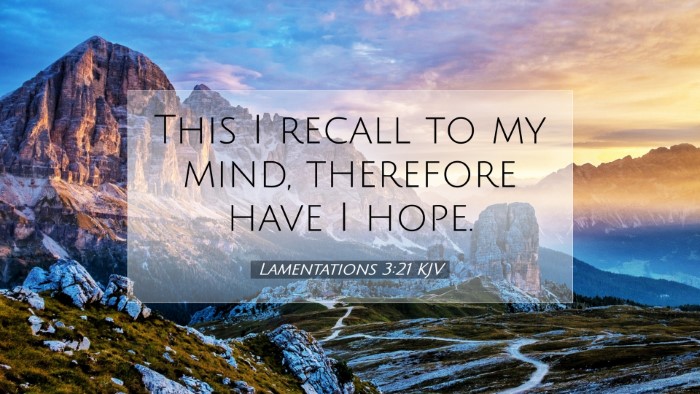Lamentations 3:21 - A Commentary
The verse Lamentations 3:21 states: "But this I call to mind, and therefore I have hope." This powerful declaration of hope amidst suffering serves as a cornerstone of the message within the Book of Lamentations. Various public domain commentaries can shed light on the deeper meanings and implications of this verse, providing invaluable insights for pastors, students, theologians, and Bible scholars.
Context of Lamentations
Lamentations, traditionally attributed to the prophet Jeremiah, is a somber reflection on the desolation of Jerusalem following the Babylonian exile. The themes of suffering, mourning, and hope are prevalent throughout the text. Understanding the context enhances our grasp of this pivotal verse.
Insights from Commentators
Matthew Henry's Commentary
Matthew Henry emphasizes that this verse signifies a turning point in the speaker's experience of despair. Henry notes that "calling to mind" is an essential act of remembrance that involves reflecting on God's attributes, promises, and past mercies.
- Hope through Remembrance: Henry points out that while the external circumstances are dire, the act of remembering God's faithfulness brings hope. This parallel of despair and hope can encourage believers to focus on the character of God.
- The Nature of Hope: He further illustrates that hope is not merely a feeling but an active response to God's truth. The speaker resolves to remember, suggesting that hope is birthed from intentionality in our thoughts.
Albert Barnes' Notes
Albert Barnes expands on the individual's inward experience of grief juxtaposed with hope. He identifies the "I call to mind" as a conscious decision to shift focus from pain to the promise of God's providence.
- From Despair to Faith: Barnes articulates that the speaker's transition from despair to faith encapsulates the essence of the believer's journey. He advocates for the importance of recalling God’s faithfulness, especially during periods of tribulation.
- The Function of Memory: Barnes highlights that memory serves a dual purpose—acknowledging suffering and recognizing hope. This duality is crucial for understanding the trials of life while resting in divine assurance.
Adam Clarke's Commentary
Adam Clarke provides a profound exploration of the verse, emphasizing the significance of hope in spiritual life. He notes that hope is energizing and life-giving, even when confronted with dire circumstances.
- Spiritual Significance of Hope: Clarke interprets hope as a divine assurance of future mercies. He indicates that this hope is anchored not in man's efforts but in the unchangeable nature of God.
- Dynamic Relationship: He also sheds light on the interaction between suffering and hope, positing that experiencing suffering can deepen one’s appreciation of hope. Clarke encourages readers to cultivate an enduring relationship with God's Word to sustain their hope.
Theological Implications
This verse offers rich theological implications for understanding human suffering and divine providence:
- The Role of Memory in Faith: The act of calling to mind reflects a theological foundation that encourages believers to engage actively with their memories of God's works.
- The Duality of Hope and Suffering: Lamentations 3:21 encapsulates a profound truth about the coexistence of despair and hope, serving as a reminder that both experiences are integral to spiritual growth.
- God’s Unfailing Love: This verse hints at the divine attributes of love and faithfulness, inviting reflection on God’s consistent character throughout trials.
Practical Applications
For pastors, students, and scholars, several practical applications of Lamentations 3:21 can enhance their ministry and study:
- Encouragement in Ministry: Pastors can use this verse as a source of encouragement for their congregations, reminding them that hope can arise even amid profound grief.
- Personal Reflection: Students and scholars are encouraged to meditate on this verse in their quiet times, using it to bridge their understanding of God’s faithfulness with the reality of their struggles.
- Building Hope through Community: Church communities can foster environments where believers share their experiences of God's past faithfulness, creating a culture that nurtures hope.
Conclusion
Lamentations 3:21 encapsulates a core message of hope amidst suffering. Drawing from commentaries by Matthew Henry, Albert Barnes, and Adam Clarke, it is evident that this verse not only speaks to the individual's experience of grief but also emphasizes the profound and transformative power of remembrance. As believers reflect on God's past mercies, they are invited to cultivate a deep, abiding hope that transcends current circumstances, reminding them of the unchanging nature of God's love and faithfulness.


